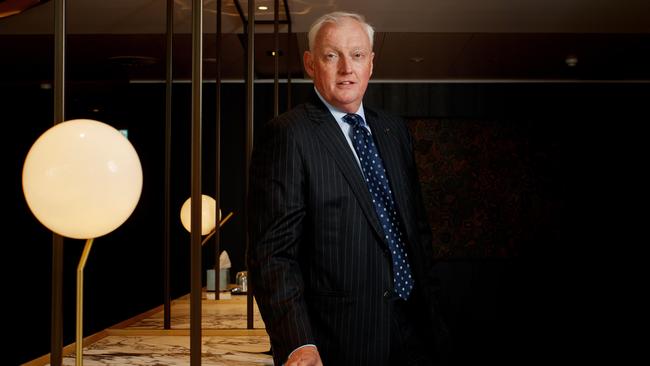Perpetual’s profit comes in below expectations and no strategy update released
Pressure is growing on Perpetual chief executive Rob Adams to deliver results after several years of acquisitions have failed to add more value than they have cost.

Perpetual chief executive officer Rob Adams has faced a market grilling after failing to provide an update on the firm’s plans to sell off parts of its business, confirming it had received “multiple approaches,” and posting a lower than expected first half profit.
“Why does it take so long? Can’t the process be quickened?,” said one analyst while another put to Mr Adams simply, “most people would have expected a bit more.”
Perpetual said underlying first half profit rose 46 per cent to a lower than expected $98.2m after the financial services operator earned money from Pendal - the rival firm it took over last year, and higher profit from its wealth management unit.
Many active fund managers are struggling to stem outflows of funds that they manage as more investors choose cheaper exchange traded products.
Perpetual has taken a Pac-Man approach to trying to halt yield pressure by gobbling up rivals. Its share price has halved since its strategy began four years ago with the US$319m acquisition of Barrow Hanley and ended with the $2.5bn takeover of Pendal.
Perpetual saw further net outflows of $4.3bn for the period, which some analysts suggested show a failed strategy in a rising equity market.
However Mr Adams said there are outflows across the US and Europe, where Perpetual has funds management operations, and that the “difficult backdrop” makes increasing FUM extremely “challenging.”
“Active managers are not finding it straightforward,” Mr Adams said. “The winners are far outweighed by those in net outflows at the moment.”
The financial services giant was the subject of a takeover offer from Washington Soul Pattinson, which wanted to buy its wealth and corporate trust units in a scrip deal that would see it take on the company’s debt, and leave the funds management arm as a listed entity.
After rejecting that offer, Perpetual then announced its own strategic review of its businesses in recognition that “the value of these businesses is not being represented in the share price,” said Mr Adams.
“We have had multiple approaches,” Mr Adams said, when questioned about speculation that private equity firms such as EQT and KKR had made non-binding offers for parts of the business.
Mr Adams said he was still as sure now as he was back when Perpetual announced its takeover of Pendal that its takeover approach was a good idea.
“In terms of the overarching strategic rationale, yes… We have global corporate client base, we have an array of global and regional capabilities based ESG capabilities.
You need to be in a position to achieve benefits of scale.
But he admits there are problems.
“The price that we’re getting paid for what we do as asset managers continues to fall. And the price of doing that service continues to rise. So we’re getting margin squeezed both ways.
“Obviously what has not been entirely to plan has been the first 12 months. We’ve had performance issues, we’ve had sporadic flows but it’s not a 12 month game. It’s a longer term game to prove up those benefits,” said Mr Adams.
He pointed to Barrow Hanley which had underperformed for its first few years since being purchased but experienced strong growth for the first half of 2024.
The asset management unit reported a 165 per cent surge in underlying profit before tax to $95.8m, largely due to the acquisition of Pendal, though it also included the Barrow Hanley figures. Total performance fees dropped 32 per cent from the second half of 2023 to $5.4m.
In wealth management, underlying profit before tax rose 18 per cent to $26m driven by a solid performance from its Fordham unit and the higher interest rate environment.
UBS said the asset management and corporate trust units had missed its expectations although wealth management had outperformed.
“This continues to be risk to the payout ratio, in our view. Overall profit miss and no firm update on strategic review will likely disappoint.
Revenue rose 69 per cent to $657.8m, again due to owning Pendal for a full six-month period and on the back of growth from its attractive corporate trust unit.
The company will pay a dividend of 65 cents per share, 35 per cent franked.
Mr Adams said expense growth for the full year would be at the higher end of its 27 - 31 per cent expectations and did not give full year profit guidance.
“We see this as a disappointing result,” said Citigroup in a research note to clients.
“While the miss to our forecasts is relatively small at 2 per cent, the result seems to have been supported by a provision release. It also sees a better than expected result from Group but a lower profit before tax margin from Asset Management implying lower quality.”




To join the conversation, please log in. Don't have an account? Register
Join the conversation, you are commenting as Logout